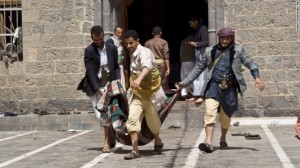By Kathryn Maureen Ryan
Impunity Watch, Managing Editor
BAGHDAD, Iraq – Iraqi forces fighting to liberate the strategic city of Tikrit from the Islamic State of Iraq and Levant (ISIS) have reportedly found that ISIS forces have booby-trapped, slowing the advance of Iraqi soldiers who have been supported by U.S airstrikes as well as Iranian fighters. “A rapid advance in a city where the ground is littered with bombs and booby-traps is too tough to achieve,” said the Tikrit Mayor Osama al-Tikriti. The use of Bobby-Traps, traps that target objects or persons with special protection under international humanitarian law or traps that are likely to attract civilians are strictly prohibited under international humanitarian law.
The security forces and Shia militias, who provided the largest number of fighters, began their offensive against ISIS on 2 March but stopped their operations temporarily after two weeks of fighting after suffering heavy casualties and tensions and seeing high tensions between the Iraqi government and with US officials over Iran’s prominent role in the fight to liberate Tikrit. Ultimately, the United States insisted on the pullback of the Iranian backed Militia as a precondition for involvement in airstrikes, General Lloyd Austin of the United States said. “Once those conditions were met – which included Shia militia not being involved – then we were able to proceed,” he told lawmakers.
Security forces said on Sunday that they were slowly advancing into Tikrit’s western area with the help of US-led airstrikes despite Shia militias boycotting the offensive. “There is some resistance from the enemy, but it’s mainly due to the booby-traps set up on the roads, in the houses, shops and government facilities,” Brigadier-General Thamer Mohamed said. “As you can see, our units are advancing and we have air support.” On Sunday, Iraqi forces attempted to clear a path through booby-trapped areas infiltrate Tikrit from the southern district of Shisheen, however the militants used anti-tank missiles to destroy a bulldozer being used by the Iraqi military create a safer path around booby-trapped roads, an official said.
Coalition airstrikes led by the United States against Islamic State of Iraq and the Levant (ISIS) targets in Tikrit began late last Wednesday. According to General Lloyd Austin of the United States, the Iranian-backed Shia militia in Iraq which has led an operation against the Islamic State of Iraq and the Levant in the strategic city of Tikrit is no longer leading the operation to recapture the city. General Austin, head of United States’ Central Command, said the withdrawal was a precondition for American-led airstrikes. However, even as airstrikes open the door for Iraqi forces to enter the city these strikes do little to protect Iraqi forces and civilians from the dangers they have found in and around the booby-trapped city.
For more information please see:
Al Jazeera – Booby-Traps Halt Iraqi Forces’ Advance On Tikrit – 30 March 2015
Reuters – Booby-Traps Halt Iraqi Forces’ Advance On Tikrit – 30 March 2015
BBC News – Iraq Crisis: Tikrit Push ‘No Longer Led By Shia Militia’ – 30 March 2015
The Washington Post – U.S. Forces Begin Airstrikes In Tikrit, Where Iran-Backed Militias Are In Lead – 25 March 2015



